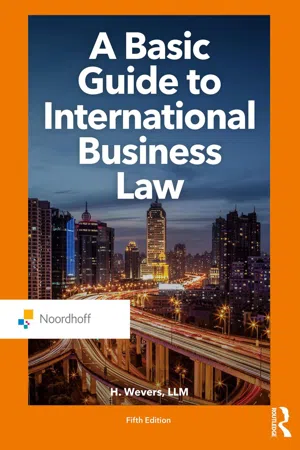
- 224 pages
- English
- ePUB (mobile friendly)
- Available on iOS & Android
A Basic Guide to International Business Law
About this book
A Basic Guide to International Business Law aims to give students an understanding as well as practical knowledge of legal problems arising in the area of international business, and to equip them with the skills needed to prevent and tackle these problems.
All Chapters employ the same didactic structure. Introductory case studies, examples, annotated case law, glossaries, diagrams, summaries and exercises are all designed to familiarize students quickly with relevant aspects of international (business) law. A Basic Guide to International Business Law deals with the following topics:
• Introduction to International Private Law and European Law
• Legal aspects of negotiations
• International contracts: matters of jurisdiction and the law applicable to these contracts
• International contracts of sale
• Competion law
• Free movement of goods, workers, the freedom of capital and establishment and the freedom to provide services
• International payments
• Carriage of goods by road and sea
• Incoterms
• Entry modes (agents, representatives, distributors, licensing, franchising)
Frequently asked questions
- Essential is ideal for learners and professionals who enjoy exploring a wide range of subjects. Access the Essential Library with 800,000+ trusted titles and best-sellers across business, personal growth, and the humanities. Includes unlimited reading time and Standard Read Aloud voice.
- Complete: Perfect for advanced learners and researchers needing full, unrestricted access. Unlock 1.4M+ books across hundreds of subjects, including academic and specialized titles. The Complete Plan also includes advanced features like Premium Read Aloud and Research Assistant.
Please note we cannot support devices running on iOS 13 and Android 7 or earlier. Learn more about using the app.
Information
1
Introduction to International Private Law and European Law
International Private Law in action
1.1 Introduction to International Private Law
- Does a Dutch court of law have jurisdiction in this case? Or should the parties turn to an English, German, Irish, Cuban, Scottish, UK or French court of law?
- What law must be applied to this case?
- Can a Dutch court of law rule on this conflict between a German employer and a Dutch employee?
- Does Dutch law apply to the individual employment contract?
- What court of law has jurisdiction?
- Is English law applicable to the sales contract?
- Is there an international treaty dealing with matters such as these?
- If there is a treaty, does it supersede English law or not?
- Is it possible for the seller – in one way or another – to declare the sales contract null and void, and if so, what would be the effects of such an act? Would the shoes be returned by the buyer?
Table of contents
- Cover
- Title Page
- Copyright Page
- Preface
- Contents
- 1 Introduction to International Private Law and European Law
- 2 Negotiations
- 3 Courts
- 4 Law
- 5 CISG
- 6 The free movement of goods, persons, services and capital
- 7 Competition law
- 8 Carriage, Incoterms, Payment and Entry modes
- Index